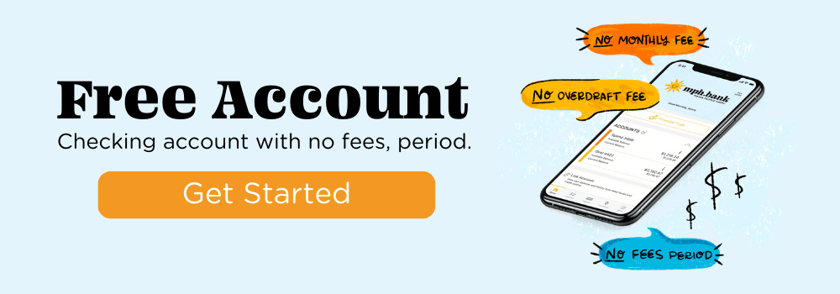"More than 60% of Americans live paycheck to paycheck—even among those earning six figures."
That stat hits like a truck, doesn’t it?
Related Article: What's the Difference Between Online and Traditional Banking?
Because it’s not just about how much you make. It’s about what you do with your money. And if you're in your 20s, the clock is ticking—fast. The financial habits you form now can either build a strong, stable foundation or become the chains that drag you through your 30s and beyond.
But here's the good news: you're not stuck. With a few smart shifts, you can ditch the habits that drain your bank account and sabotage your credit score—before they become permanent.
Let’s break down the top financial habits to leave behind before you hit the big 3-0. This isn't fluff. It's practical. It's direct. And if you're ready, it can change your entire financial future.
1. Relying on Overdraft Protection Like a Crutch
Overdraft protection sounds like a safety net. And it is—but it comes with razor-sharp strings.
Every time you dip into overdraft territory, you could be hit with a $35 fee. That late-night coffee run or forgotten app subscription can cost more than a steak dinner.
What to do instead:
- Turn off overdraft protection unless you’re in a pinch.
- Set up low balance alerts with your bank.
- Use a budgeting app to track spending in real time.
Avoiding overdraft isn't just about avoiding fees. It's about building the habit of staying aware—and staying in control.
2. Closing Old Credit Cards Prematurely
You got your first credit card at 19. Now you’re 27 and want to "clean things up." Makes sense—but wait.
Credit age matters. It accounts for 15% of your credit score.
Shutting down that old card may feel tidy, but it could ding your score.
What to do instead:
- Keep old cards open with no annual fee.
- Use them for one small purchase a month and auto-pay the bill.
- Let them age like a fine wine, quietly boosting your credit profile.
3. Ignoring Your Credit Report
You wouldn't ignore your health checkup. So why skip your financial one?
Mistakes happen. Fraud happens. And if you’re not watching, your credit score could silently take a nosedive.
Action steps:
- Check your credit report (for free) at AnnualCreditReport.com at least once a year.
- Dispute anything suspicious or incorrect.
- Monitor your score monthly with a trusted free tool like Credit Karma or Experian.
4. Paying the Minimum on Credit Cards
Paying just the minimum isn’t “good enough.” It’s a trap.
Interest piles on. Balances balloon. A $1,000 debt can turn into $3,000 over time.
Fix this fast:
- Always aim to pay more than the minimum.
- Try the avalanche or snowball method to knock out balances.
- Automate extra payments if you can.
Minimum payments are like financial quicksand. Look down, and you’ve already sunk.
5. Treating Your Checking Account Like a Savings Account
Your checking account is for spending. Savings is for protecting.
When everything lives in one account, it’s way too easy to spend what should’ve been saved.
What to do:
- Open a high-yield savings account (online banks often have the best rates).
- Automate transfers on payday—even if it’s just $25.
- Give savings a job: emergency fund, travel, car maintenance.
Out of sight, out of swipe range.
6. Not Having a Budget (Or Using One That Doesn’t Work)
Budgeting doesn’t have to be a spreadsheet from hell.
It’s just a plan. A map. And it needs to work for you.
Try this:
- Use the 50/30/20 rule as a starter: 50% needs, 30% wants, 20% savings/debt.
- Apps like YNAB, Rocket Money, or Mint can help you track and automate.
- Review your budget monthly and adjust for real life.
A good budget isn’t rigid—it’s responsive.
7. Avoiding Financial Conversations
Money stress thrives in silence.
Whether it’s roommates, partners, or parents—avoiding the talk usually makes things worse.
Build the habit:
- Schedule regular money check-ins with your partner.
- Be honest with friends about budgets when making plans.
- Ask questions. Seek clarity. Don’t fake it till you break it.
Being open about money now makes adulting a whole lot easier later.
8. Not Saving for Retirement Because It Feels Too Far Away
Compound interest is magic. And magic takes time.
The earlier you start, the less you have to save.
Let’s do quick math:
- Save $200/month from age 25 to 65 at 7% interest: you’ll have over $500,000.
- Wait until 35 to start? You’ll need to save $400/month to catch up.
Start small. Start now. Future-you will be forever grateful.
9. Using Buy Now, Pay Later as a Crutch
Klarna, Afterpay, Affirm—these services make spending feel painless.
But that’s the problem.
You’re splitting payments, not removing costs. And if you miss one? Hello, late fees and potential credit impact.
Strategy:
- Treat BNPL like a credit card—only buy what you can already afford.
- Keep track of active payment plans.
- Don’t stack them. It gets out of control fast.
10. Letting Bank Fees Steal Your Money in Plain Sight
Monthly maintenance fees. ATM fees. Paper statement fees.
They sound small—until you realize you’re losing hundreds each year.
Break the habit:
- Choose a checking account with no monthly fees.
- Use in-network ATMs or switch to a bank with ATM reimbursements.
- Go paperless and avoid “administrative” charges.
You earned that money. Don’t let your bank quietly take it back.
Your 30s Will Thank You
This isn’t about perfection. It’s about patterns.
The financial habits you break now will give you options later—whether it’s buying a house, taking a sabbatical, or simply not stressing over every dollar.
You’ve got time. You’ve got tools. And now, you’ve got the knowledge.
Break the habits. Build the future. And hey, if you ever want to brag about your budgeting skills at brunch—we won’t stop you!
What do fish use as currency to purchase anything?
Sand Dollars! Sign up to receive important information on banking, financial tips, and jokes like this directly to your inbox










